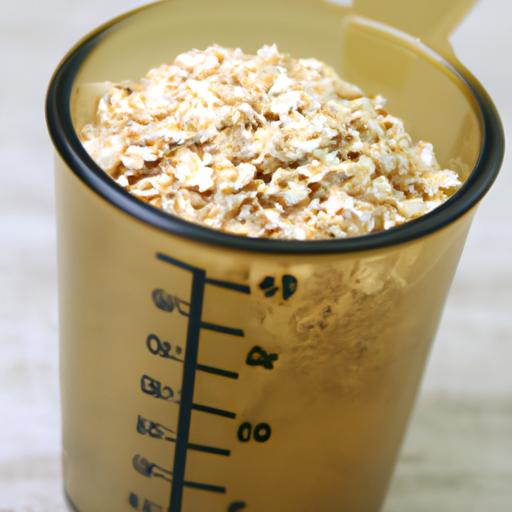100g Oats Nutrition Facts: Everything You Need to Know
If you’re looking for a nutritious and filling breakfast option, oats are an excellent choice. Not only are they affordable and widely available, but they are also packed with essential nutrients that can support your overall health. In this article, we’ll take a closer look at the nutrition facts of 100g oats, so you can make an informed decision about whether they are right for you.
Calories in 100g Oats

Understanding the calorie content of your food is essential when trying to maintain a healthy weight. Luckily, 100g oats are relatively low in calories, making them an ideal option for those looking to watch their calorie intake. A 100g serving of oats contains approximately 389 calories, which is a relatively low amount compared to other breakfast options like pancakes or waffles.
It’s important to note that the calorie count of your oats will increase depending on how you prepare them. For example, if you add sugar, honey, or other sweeteners to your oats, the calorie count will increase. Similarly, if you add milk or cream to your oats, the calorie count will increase even more.
Macronutrients in 100g Oats
Macronutrients are the nutrients that your body needs in large amounts to function correctly. The three main macronutrients are carbohydrates, protein, and fat, and all three can be found in 100g oats. Here’s a closer look at the macronutrient breakdown of 100g oats:
Carbohydrates
Carbohydrates are the primary source of energy for your body, and they can be found in abundance in 100g oats. A 100g serving of oats contains approximately 66g of carbohydrates, which is a relatively high amount compared to other breakfast options. However, the majority of the carbohydrates in oats come from dietary fiber, which is essential for maintaining digestive health.
Protein
Protein is an essential macronutrient that is necessary for building and repairing tissues in your body. A 100g serving of oats contains approximately 17g of protein, which is a relatively high amount compared to other breakfast options. However, it’s important to note that the protein in oats is not complete, meaning it does not contain all of the essential amino acids that your body needs.
Fat
Finally, fat is another macronutrient that can be found in 100g oats. A 100g serving of oats contains approximately 6g of fat, which is a relatively low amount compared to other breakfast options. The majority of the fat in oats comes from unsaturated fats, which are healthy fats that can support heart health.
Micronutrients in 100g Oats
Micronutrients are the nutrients that your body needs in smaller amounts to function correctly. Although they may not provide energy in the same way that macronutrients do, they are still essential for supporting your overall health. Here’s a closer look at the micronutrient breakdown of 100g oats:
Vitamins
100g oats contain a variety of essential vitamins, including:
- Vitamin B1 (Thiamin): important for converting food into energy and maintaining a healthy nervous system.
- Vitamin B2 (Riboflavin): necessary for energy production and maintaining healthy skin and eyes.
- Vitamin B3 (Niacin): necessary for energy production and maintaining healthy skin, nerves, and digestion.
- Vitamin B6: important for brain development and function, as well as immune system health.
- Vitamin E: a powerful antioxidant that helps protect your cells from damage.
Minerals
100g oats also contain several important minerals, including:
- Iron: necessary for the production of red blood cells and maintaining healthy immune function.
- Zinc: important for wound healing, immune function, and protein synthesis.
- Magnesium: necessary for healthy bones, muscles, and nerves.
- Phosphorus: important for healthy bones and teeth, as well as energy production.
Health Benefits of 100g Oats
In addition to providing essential nutrients, 100g oats also offer several potential health benefits. Here are just a few:
Weight Management
Because 100g oats are high in fiber and protein, they can help you feel fuller for longer, which may help you eat fewer calories throughout the day. This can make them a valuable addition to any weight loss or weight management plan.
Blood Sugar Control
100g oats are a low glycemic index food, meaning they are digested slowly and do not cause a rapid spike in blood sugar levels. This can be especially beneficial for individuals with diabetes or those looking to manage their blood sugar levels.
Heart Health
The beta-glucan fiber found in 100g oats has been shown to lower cholesterol levels, which can help reduce the risk of heart disease. Additionally, the magnesium and potassium found in oats can help support healthy blood pressure levels.
Overall, 100g oats are an excellent option for anyone looking to boost their nutrient intake and support their overall health. Whether you enjoy them as a hot breakfast cereal, in homemade granola, or as a savory side dish, there are countless ways to incorporate oats into your diet. Try experimenting with different recipes and flavor combinations to find your perfect oats dish.
Health Benefits of Consuming 100g Oats
Beyond the macronutrients and calories, 100g oats offer a host of health benefits that make them an ideal breakfast option. Here are just a few of the ways that consuming oats can support your overall health:
Weight Loss
One of the most significant benefits of consuming oats is that they can help with weight loss. The high fiber content in oats can help you feel fuller for longer, which can reduce your overall calorie intake and help you lose weight. Additionally, the complex carbohydrates in oats can provide sustained energy throughout the day, which can reduce cravings for unhealthy snacks.
Blood Sugar Control
For those with diabetes or those looking to manage their blood sugar levels, oats can be an excellent choice. The high fiber content in oats can slow down the absorption of sugar into your bloodstream, which can prevent blood sugar spikes and crashes. Additionally, the complex carbohydrates in oats can provide sustained energy without causing blood sugar spikes.
Heart Health
Finally, consuming oats can support heart health in a variety of ways. The soluble fiber in oats can help lower cholesterol levels, which can reduce the risk of heart disease. Additionally, the high levels of antioxidants in oats can reduce inflammation throughout the body, which can also reduce the risk of heart disease.
Conclusion
In conclusion, 100g oats are an excellent breakfast option for those looking to maintain a healthy weight and support their overall health. With a relatively low calorie count and high levels of essential nutrients like carbohydrates, protein, and fiber, oats can provide sustained energy throughout the day without causing blood sugar spikes or crashes. Additionally, the health benefits of consuming oats, such as weight loss support, blood sugar control, and heart health benefits, make them an ideal choice for those looking to live a healthy lifestyle. If you’re looking to incorporate oats into your diet, try adding them to your morning routine with some fresh fruit, nuts, and a splash of milk. Zahnweiss Info recommends incorporating 100g oats into your diet to improve your overall health and wellbeing.




